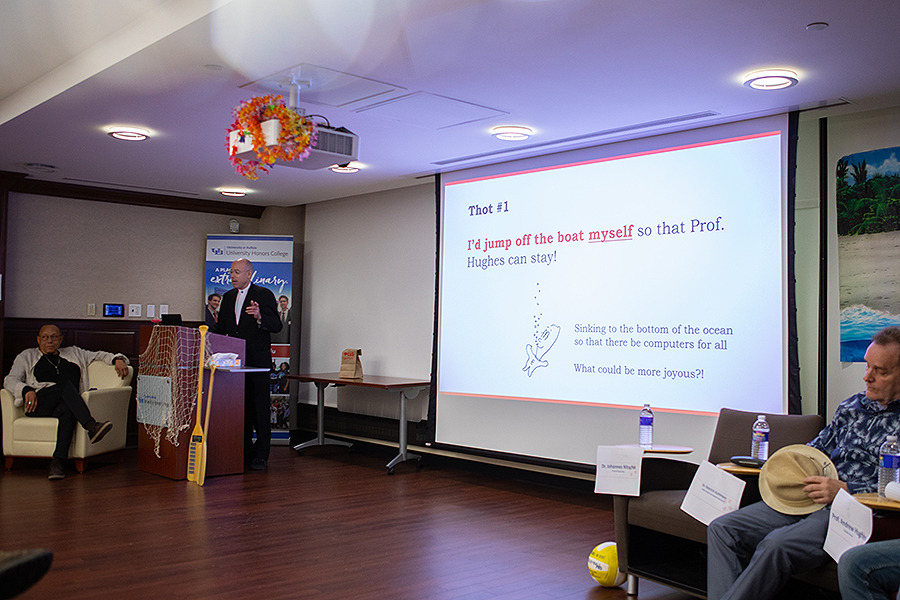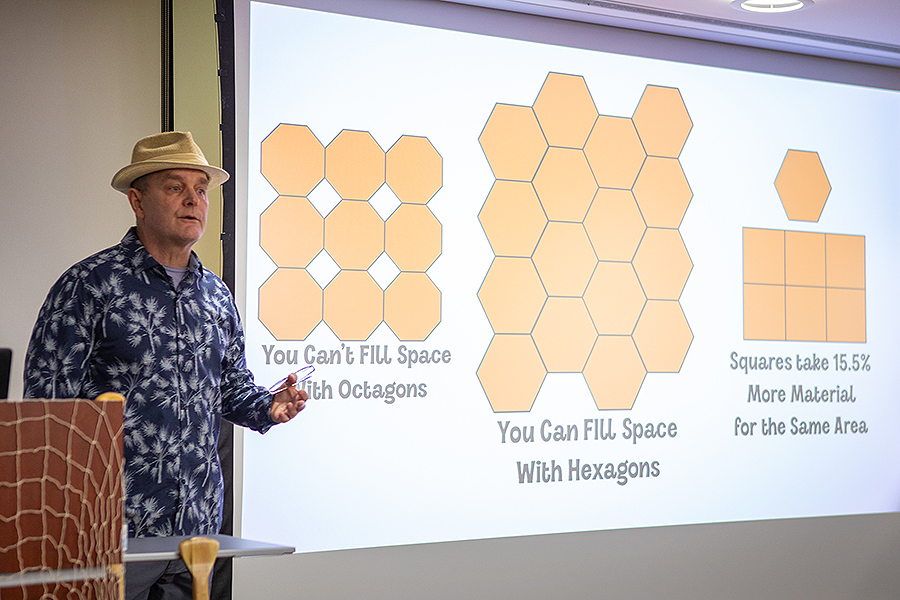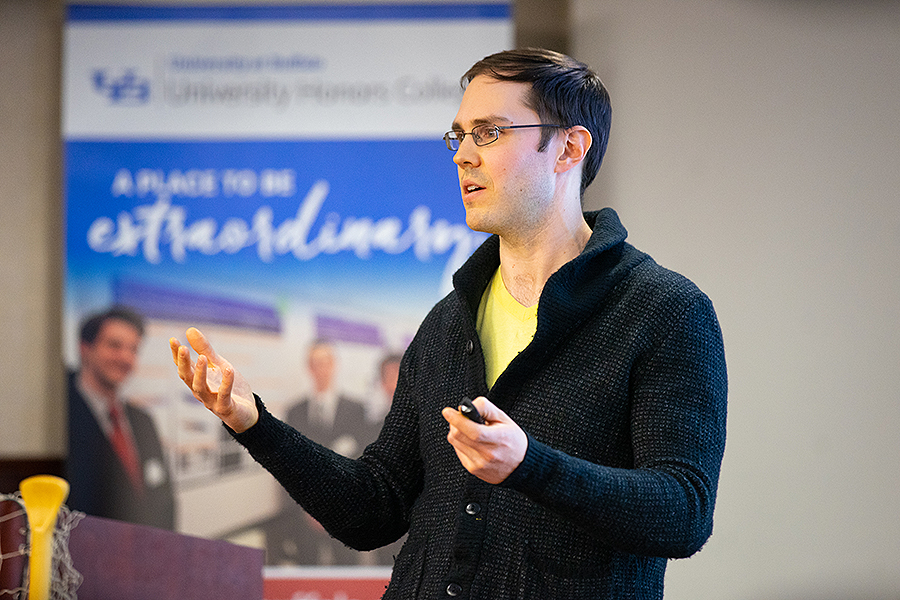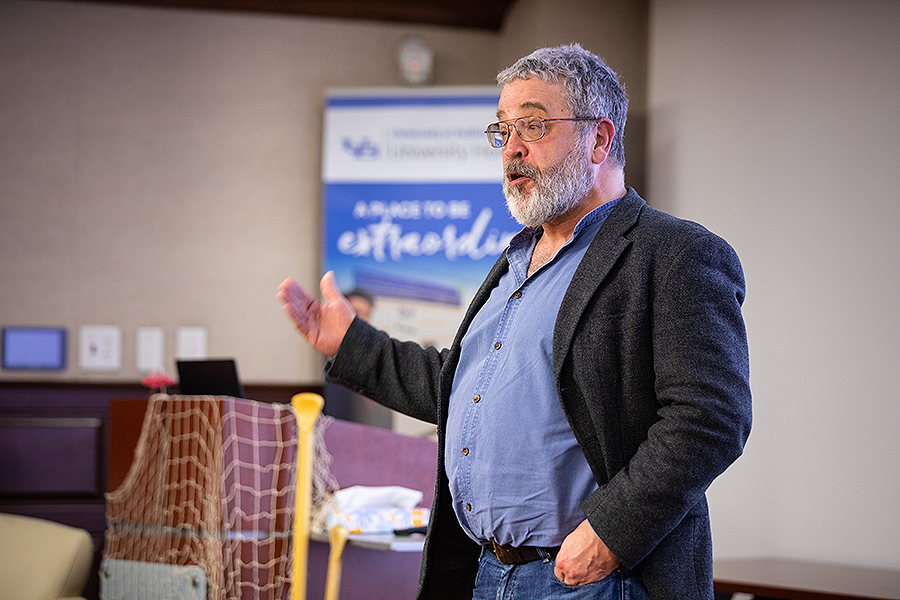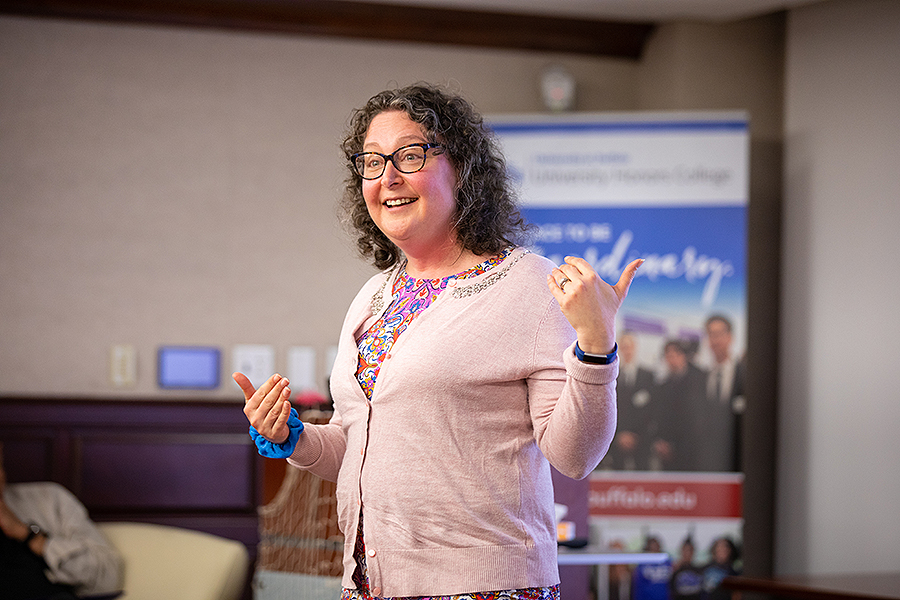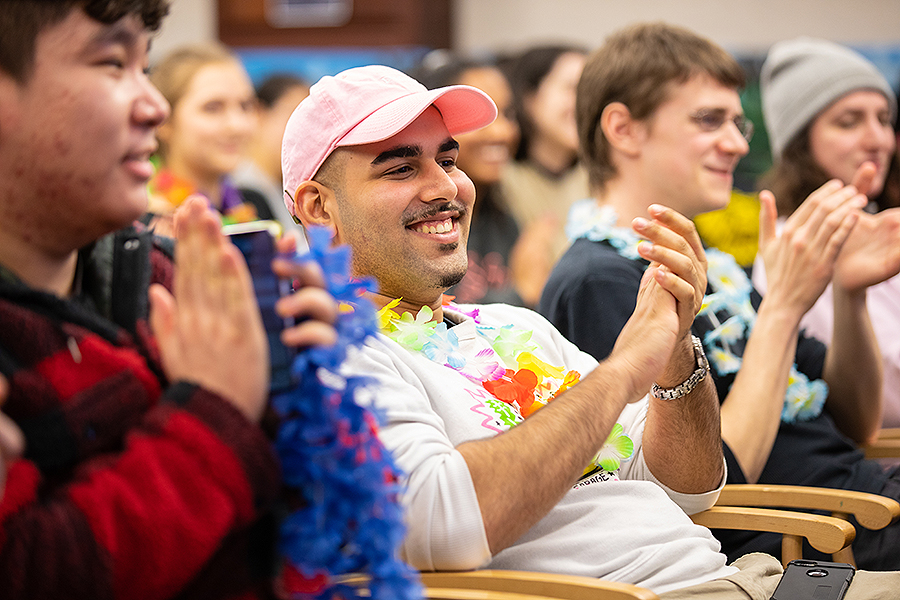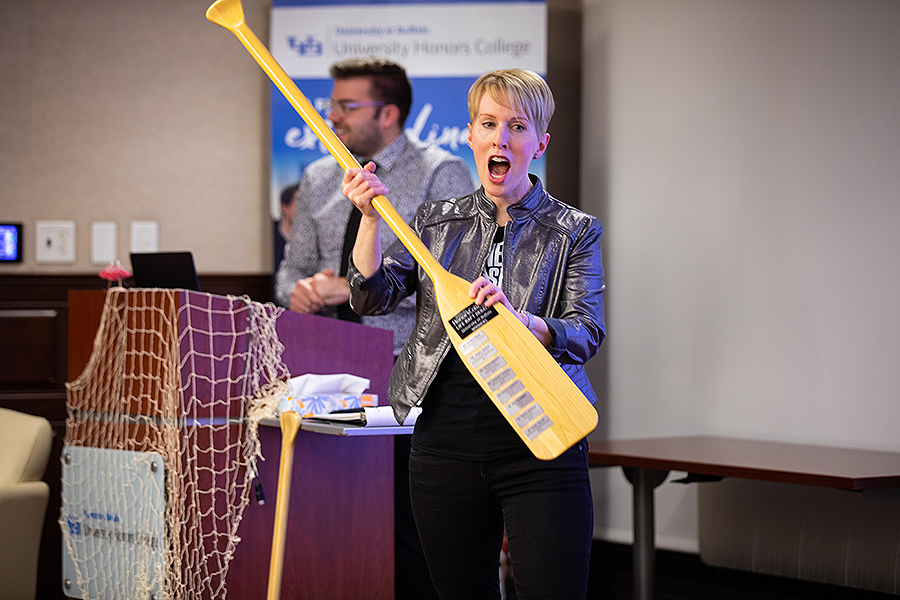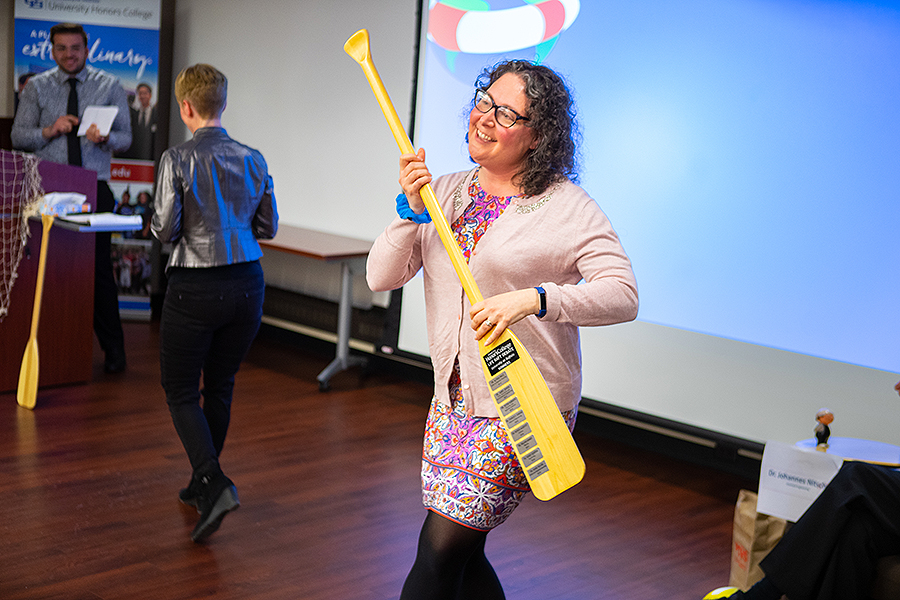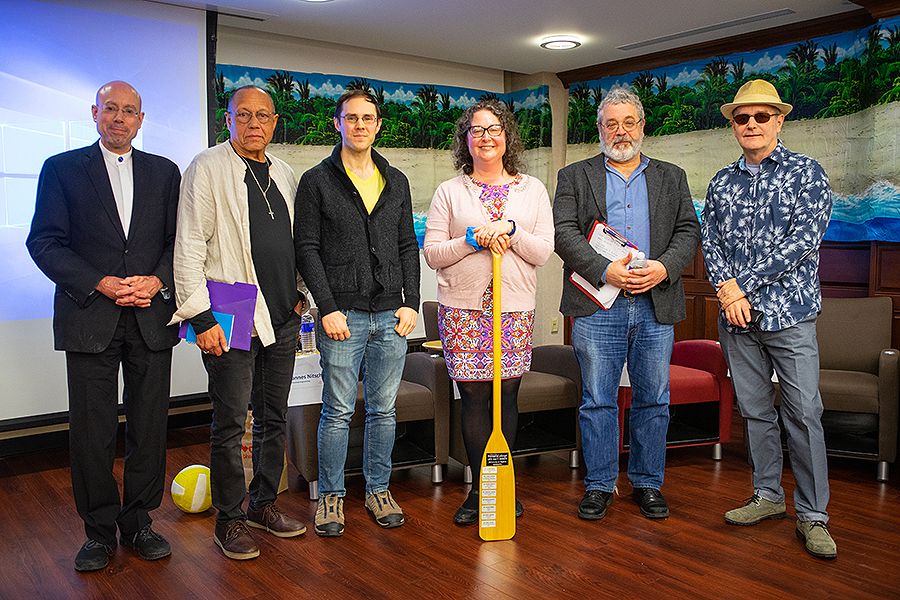Campus News
Faculty fight for their discipline at Life Raft Debate
The stage is set for the annual Life Raft Debate in the Honors College in Capen Hall. Photos: Douglas Levere
By GINA CARBONE
Published March 11, 2020 This content is archived.
Imagine a small group of UB students given the responsibility of choosing a faculty member they believe is best able to help them rebuild society from the ground up. These students have just survived nuclear disaster and must carefully choose only one faculty member to join them aboard a life raft.
That’s the scenario behind the ninth annual Life Raft Debate held March 4 in 107 Capen Hall. The five surviving UB faculty members from which students would choose their leader were Johannes Nitsche, Dietrich Kuhlmann, Andrew Hughes, James Holstun and Shira Gabriel.
The ultimate question: Who — and what discipline — is worth saving? Each of these survivors must argue his or her case, convincing the audience that academic discipline is both indispensable and invaluable to a post-nuclear world.
“One thing I’d like to let you know is how much courage it takes to tackle a defense of your discipline,” said psychology professor Wendy Quinton, master of ceremonies for the debate and director of the honors program in the Department of Psychology, before introducing the five panelists, who then began arguing for their spot. Quinton won the 2018 Life Raft Debate, which is sponsored by the Honors College.
Nitsche, a SUNY Distinguished Teaching Professor in the Department of Chemical and Biological Engineering, went first. His audience laughed when he said he would voluntarily jump off the boat to give up his spot for Hughes’ knowledge of computers.
The Life Raft Debate is always an entertaining evening. Photo: Douglas Levere
Nitsche referred to chemical engineering as the driving force behind biodegradable material, cancer treatment and, even simply, cooking. He humorously posed a scenario of a survivor searching for food in the desert, incapable of cooking without his knowledge of heat transfer technology.
“Chemical engineers can save lives,” Nitsche reassured the audience.
Kuhlmann, undergraduate director and research professor in the Department of Biostatistics, opened his argument by defining mathematics as a means of beginning a new life without access to the Internet and electricity.
Kuhlmann argued that the ancient Roman civilization accessed water through the construction of aqueducts, which required extensive math skills. He then argued that all the other disciplines require math as a prerequisite. Without math, he claimed, they wouldn’t be possible. Kuhlmann closed his presentation by noting that mathematics is the ruling force behind students’ most beloved treasures: the internet and their smartphones.
“Roses are red, violets are blue, I want to survive, how about you?” Kuhlmann asked the audience.
Photos: Douglas Levere
Holstun, associate professor in the Department of English, took an intellectual and political approach, claiming he wouldn’t defend his discipline. Instead, he would simply “practice it” through his argument. He then suggested the audience reevaluate the situation they have been put in.
“Let’s write a better story before it’s too late,” Holstun said. “Are we already living inside a version of this imagined nuclear disaster?”
He cited the Trump administration’s deployment of a “baby nuke” last month and rising CO2 emissions as real-life examples of society’s dangers.
“We’re going to need a bigger boat,” Holstun said in closing, referencing the film “Jaws.”
Gabriel, associate professor in the Department of Psychology, told audience members that psychology covers every discipline, suggesting that her knowledge of each branch of psychology could be helpful in coping with a horrific event, such as surviving a nuclear disaster, and the rebuilding process.
By understanding these different areas, Gabriel claimed, she has all the tools needed to successfully build a new society.
“When we build our new society, we want to do better,” she said. “We want to capitalize on the strengths. Human beings have foibles and bad stuff about us, but we also have awesome stuff, and psychologists know both of those things.”
Hughes, assistant professor of teaching in the Department of Computer Science and Engineering, began by outlining his credentials, which included growing plants in his free time. He emphasized the need to optimize plant growth with the implementation of code-generated sensors.
“We would need to automate everything,” he said. “Automation software and image processing can tell us how plants are growing and when crops are ready to be harvested. The first and foremost thing is getting food, and without that, we wouldn’t get anywhere.”
Hughes highlighted how his field uses drones. With drones, artificial intelligence and algorithms, he said, society can navigate through radiation and transport the produce that is grown.
Henry Louis Taylor Jr. played Devil's Advocate, arguing that the challenges faced by those on the life raft are too great for any single discipline to overcome. Photo: Douglas Levere
After rebuttals by each faculty member, Henry Louis Taylor Jr., professor in the Department of Urban and Regional Planning and winner of last year’s Life Raft Debate, made his case as the devil’s advocate, critiquing each faculty member’s argument. The challenges faced by those on the life raft are too great for any single discipline to overcome, Taylor maintained.
“The solution to the riddle is to use our discipline as a window through which to see other disciples so that we can understand how they connect and interact with one another,” he said. “Such a powerful framework, I contend, can only be conjured up by a bold new vision of society: a vision of society that is rooted in racial and social justice. There can be no other way.”
After all the arguments were completed, it was time for the audience to vote. Gabriel emerged as the winner. She beamed with pride as she held up her prize, a rowing oar that commemorates all past Life Raft Debate winners.






